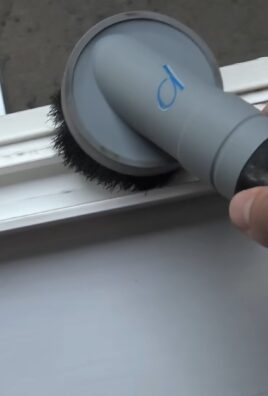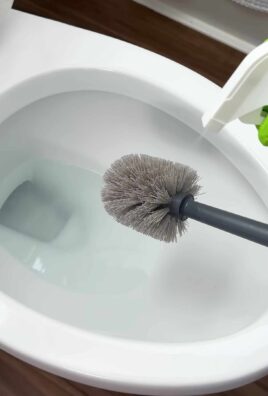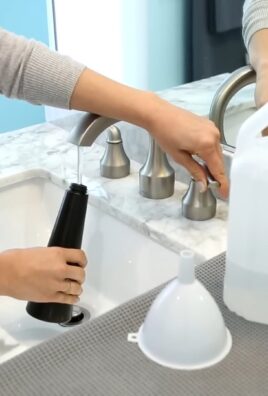Amish cleaning hacks – ever wondered how those immaculately kept Amish homes maintain their pristine shine without relying on a cabinet full of harsh chemicals? I know I have! For generations, Amish communities have relied on resourcefulness and a deep connection to nature, developing ingenious cleaning methods passed down through families. These aren’t just cleaning tips; they’re a testament to a simpler, more sustainable way of life, echoing a time when elbow grease and natural ingredients were the cornerstones of a spotless home.
But why should you care about Amish cleaning hacks in our modern world overflowing with cleaning products? Because these time-tested techniques are not only incredibly effective, but they’re also gentle on your home, your health, and your wallet! We’re talking about ditching those expensive, chemical-laden sprays and embracing natural solutions that are often already in your pantry. Imagine a home that sparkles, smells fresh, and is free from harmful toxins – all thanks to the wisdom of the Amish.
In this article, I’m thrilled to share some of the most effective and easy-to-implement Amish cleaning hacks that you can start using today. Get ready to discover the secrets to a cleaner, healthier, and happier home, the Amish way!

Unlocking Amish Cleaning Secrets: A DIY Guide to a Spotless Home
Hey there, fellow cleaning enthusiasts! I’m always on the lookout for effective and natural cleaning methods, and let me tell you, the Amish have some seriously impressive tricks up their sleeves. They’re known for their simple living and resourcefulness, and that extends to their cleaning practices. Forget harsh chemicals and expensive gadgets – we’re going back to basics with these amazing Amish cleaning hacks!
Understanding the Amish Cleaning Philosophy
Before we dive into the nitty-gritty, it’s important to understand the core principles behind Amish cleaning. It’s all about:
* Natural Ingredients: They rely heavily on ingredients you probably already have in your pantry, like vinegar, baking soda, and lemon juice.
* Simplicity: No need for fancy equipment or complicated routines. Their methods are straightforward and efficient.
* Sustainability: They prioritize eco-friendly practices that are gentle on the environment.
* Hard Work: While their methods are simple, they aren’t afraid of a little elbow grease!
Hack 1: The All-Purpose Vinegar Cleaner
Vinegar is a powerhouse cleaner, and the Amish know it! This all-purpose cleaner is perfect for countertops, floors, windows, and more.
What You’ll Need:
* White vinegar
* Water
* Spray bottle
* Essential oil (optional, for scent)
Step-by-Step Instructions:
1. Mix the Solution: In your spray bottle, combine equal parts white vinegar and water. For example, you could use 1 cup of vinegar and 1 cup of water.
2. Add Essential Oil (Optional): If you want to add a pleasant scent, add a few drops of your favorite essential oil. Lavender, lemon, and tea tree oil are all great choices. I personally love using lemon for its fresh, clean smell.
3. Shake Well: Give the bottle a good shake to ensure the ingredients are properly mixed.
4. Spray and Wipe: Spray the solution onto the surface you want to clean and wipe it down with a clean cloth or sponge.
5. Dry (If Necessary): For surfaces that are prone to water spots, like glass or stainless steel, dry them with a clean, dry cloth after wiping.
Pro Tip: Don’t use vinegar on natural stone surfaces like marble or granite, as it can damage them.
Hack 2: Baking Soda for Scrubbing Power
Baking soda is a gentle abrasive that’s perfect for tackling tough stains and grime. The Amish use it for everything from cleaning ovens to scrubbing sinks.
What You’ll Need:
* Baking soda
* Water
* Sponge or scrub brush
Step-by-Step Instructions:
1. Make a Paste: In a small bowl, mix baking soda with enough water to form a thick paste. The consistency should be similar to toothpaste.
2. Apply the Paste: Apply the paste to the surface you want to clean. For tough stains, let the paste sit for a few minutes before scrubbing.
3. Scrub: Use a sponge or scrub brush to scrub the surface. Apply firm pressure, but be careful not to scratch delicate surfaces.
4. Rinse: Rinse the surface thoroughly with water to remove the baking soda residue.
5. Dry: Dry the surface with a clean cloth.
Uses for Baking Soda:
* Oven Cleaning: Spread the paste inside your oven, let it sit overnight, and then scrub and rinse.
* Sink Cleaning: Sprinkle baking soda in your sink and scrub with a damp sponge.
* Tile and Grout Cleaning: Apply the paste to tile and grout, let it sit for a few minutes, and then scrub and rinse.
* Deodorizing: Place an open box of baking soda in your refrigerator or freezer to absorb odors.
Hack 3: Lemon Juice for Brightening and Disinfecting
Lemon juice is a natural disinfectant and brightener that can be used to clean a variety of surfaces. Plus, it smells amazing!
What You’ll Need:
* Lemon juice
* Water
* Spray bottle or bowl
* Cloth or sponge
Step-by-Step Instructions:
1. Dilute the Lemon Juice: In a spray bottle or bowl, mix equal parts lemon juice and water.
2. Apply to Surface: Spray or pour the solution onto the surface you want to clean.
3. Let it Sit: Let the solution sit for a few minutes to allow the lemon juice to work its magic.
4. Wipe Clean: Wipe the surface clean with a cloth or sponge.
5. Dry: Dry the surface with a clean cloth.
Uses for Lemon Juice:
* Cutting Board Disinfecting: Pour lemon juice onto your cutting board, let it sit for a few minutes, and then rinse.
* Microwave Cleaning: Place a bowl of lemon juice and water in your microwave and heat for a few minutes. The steam will loosen grime, making it easy to wipe clean.
* Hard Water Stain Removal: Soak a cloth in lemon juice and place it over hard water stains. Let it sit for a few hours, and then scrub and rinse.
* Brightening Laundry: Add a cup of lemon juice to your washing machine to brighten white clothes.
Hack 4: The Power of Sunshine and Fresh Air
The Amish believe in the power of sunshine and fresh air to naturally disinfect and deodorize.
What You’ll Need:
* Sunshine
* Fresh air
Step-by-Step Instructions:
1. Hang Clothes Outside: Hang your clothes outside on a clothesline to dry in the sun. The sun’s UV rays will help to kill bacteria and freshen your clothes.
2. Air Out Bedding: Air out your bedding regularly by hanging it outside in the sun. This will help to kill dust mites and freshen your bedding.
3. Open Windows: Open your windows regularly to let fresh air circulate throughout your home. This will help to remove stale odors and improve air quality.
4. Sun-Dry Dishes: After washing your dishes, let them air dry in the sun. The sun will help to disinfect them and prevent water spots.
Benefits of Sunshine and Fresh Air:
* Natural Disinfectant: The sun’s UV rays are a natural disinfectant that can kill bacteria and viruses.
* Deodorizing: Fresh air can help to remove stale odors and improve air quality.
* Eco-Friendly: Using sunshine and fresh air is a sustainable and eco-friendly way to clean and disinfect.
Hack 5: Homemade Laundry Detergent
Commercial laundry detergents can be expensive and full of harsh chemicals. The Amish make their own laundry detergent using simple, natural ingredients.
What You’ll Need:
* 1 cup Borax
* 1 cup washing soda (sodium carbonate)
* 1 bar of soap (like Fels-Naptha or Zote), grated
Step-by-Step Instructions:
1. Grate the Soap: Use a cheese grater to grate the bar of soap into fine pieces.
2. Combine Ingredients: In a large bowl, combine the grated soap, Borax, and washing soda.
3. Mix Well: Mix the ingredients thoroughly until they are evenly distributed.
4. Store in an Airtight Container: Store the laundry detergent in an airtight container.
5. Use Sparingly: Use only 1-2 tablespoons of laundry detergent per load.
Tips for Using Homemade Laundry Detergent:
* Test on a Small Area: Before using the detergent on a large load of laundry, test it on a small, inconspicuous area to make sure it doesn’t cause any discoloration or damage.
* Adjust the Amount: Adjust the amount of detergent you use based on the size and soil level of your laundry load.
* Add Vinegar to the Rinse Cycle: Add a cup of white vinegar to the rinse cycle to help remove any detergent residue and soften your clothes.
Hack 6: Cleaning Cast Iron the Amish Way
Cast iron cookware is a staple in many Amish kitchens. Here’s how they keep it clean and well-seasoned.
What You’ll Need:
* Hot water
* Scrub brush or sponge
* Dish soap (optional, use sparingly)
* Towel
* Cooking oil (vegetable, canola, or flaxseed)
Step-by-Step Instructions:
1. Rinse Immediately After Use: After cooking, rinse your cast iron skillet with hot water while it’s still warm.
2. Scrub Gently: Use a scrub brush or sponge to remove any food particles. Avoid using abrasive scrubbers that can damage the seasoning.
3.

Conclusion
So, there you have it! Embracing these time-tested Amish cleaning hacks isn’t just about saving money; it’s about connecting with a simpler, more sustainable way of life. These methods, passed down through generations, prove that you don’t need harsh chemicals or expensive gadgets to achieve a sparkling clean home. The beauty of these hacks lies in their simplicity and effectiveness. They rely on readily available, natural ingredients, making them not only budget-friendly but also environmentally conscious.
Think about it: no more battling stubborn stains with products that leave behind lingering fumes. Instead, you’re harnessing the power of vinegar, baking soda, and elbow grease – a winning combination that’s gentle on your home and your health. Plus, you’re reducing your reliance on plastic containers and contributing to a cleaner planet.
But the benefits extend beyond just a clean house and a clear conscience. These Amish cleaning hacks offer a sense of accomplishment and connection to a tradition of resourcefulness. There’s something deeply satisfying about creating your own cleaning solutions and witnessing their effectiveness firsthand. It’s a reminder that we have the power to take control of our cleaning routines and make choices that align with our values.
And don’t be afraid to experiment! While the core principles remain the same, you can adapt these hacks to suit your specific needs and preferences. For instance, if you’re not a fan of the strong scent of vinegar, try infusing it with citrus peels for a more pleasant aroma. Or, if you’re dealing with particularly stubborn grime, add a few drops of essential oil with antibacterial properties, such as tea tree or lavender, to your cleaning solution.
Consider these variations:
* **Lemon-Infused Vinegar:** Steep lemon peels in white vinegar for a week to create a citrus-scented cleaner perfect for countertops and bathrooms.
* **Baking Soda Paste with Essential Oils:** Mix baking soda with a few drops of your favorite essential oil (lavender, peppermint, or eucalyptus work well) to create a powerful scrubbing paste for sinks and tubs.
* **Castile Soap All-Purpose Cleaner:** Dilute castile soap with water and add a few drops of tea tree oil for a gentle yet effective all-purpose cleaner.
These are just a few ideas to get you started. The possibilities are endless! The key is to find what works best for you and your home.
We wholeheartedly encourage you to give these Amish cleaning hacks a try. You might be surprised at how effective and enjoyable they are. Not only will you save money and reduce your environmental impact, but you’ll also discover a newfound appreciation for the power of simple, natural cleaning solutions.
Once you’ve experienced the magic of these time-tested techniques, we’d love to hear about your results! Share your experiences, tips, and variations in the comments below. Let’s create a community of resourceful cleaners who are committed to a cleaner home and a cleaner planet. Your insights could inspire others to embrace these wonderful Amish cleaning hacks and discover the joy of simple, effective cleaning. So, go ahead, give it a try, and let us know what you think!
Frequently Asked Questions (FAQ)
What exactly are Amish cleaning hacks?
Amish cleaning hacks are traditional cleaning methods and solutions used by Amish communities, often relying on natural, readily available ingredients like vinegar, baking soda, and castile soap. These methods prioritize simplicity, effectiveness, and sustainability, avoiding harsh chemicals and expensive commercial cleaners. They are passed down through generations and emphasize resourcefulness and frugality.
Why should I use Amish cleaning hacks instead of commercial cleaners?
There are several compelling reasons to switch to Amish cleaning hacks. First, they are significantly more cost-effective than commercial cleaners. The ingredients are typically inexpensive and can be purchased in bulk. Second, they are much safer for your health and the environment. Commercial cleaners often contain harsh chemicals that can irritate your skin, eyes, and respiratory system, and they can also pollute waterways. Amish cleaning hacks, on the other hand, use natural ingredients that are biodegradable and less likely to cause harm. Third, they are often just as effective, if not more so, than commercial cleaners. Vinegar, for example, is a powerful disinfectant and degreaser, while baking soda is an excellent abrasive cleaner and deodorizer. Finally, using Amish cleaning hacks allows you to reduce your reliance on plastic packaging and contribute to a more sustainable lifestyle.
Are these cleaning hacks safe for all surfaces?
While most Amish cleaning hacks are generally safe for a wide range of surfaces, it’s always a good idea to test them in an inconspicuous area first, especially on delicate or sensitive materials like marble, granite, or wood. For example, while vinegar is a great cleaner, its acidity can etch certain types of stone. Baking soda, while generally mild, can be abrasive on polished surfaces. Always dilute cleaning solutions appropriately and use a soft cloth to avoid scratching. When in doubt, consult the manufacturer’s instructions for the specific surface you’re cleaning.
Where can I find the ingredients for these cleaning hacks?
The ingredients for Amish cleaning hacks are readily available at most grocery stores and pharmacies. White vinegar, baking soda, and castile soap are staples that can be found in the cleaning aisle or the baking section. Essential oils can be purchased at health food stores or online retailers. You may also be able to find some ingredients, such as citrus peels, in your own kitchen!
How do I store homemade cleaning solutions?
Homemade cleaning solutions should be stored in clean, airtight containers, preferably glass or reusable plastic bottles. Label each container clearly with the name of the solution and the date it was made. Store them in a cool, dark place away from direct sunlight and heat. Most homemade cleaning solutions will last for several months, but it’s always a good idea to discard them if they start to look cloudy or develop an unusual odor.
Can I use essential oils in all of these cleaning hacks?
While essential oils can add a pleasant scent and antibacterial properties to your cleaning solutions, it’s important to use them sparingly and with caution. Some essential oils can be irritating to the skin or respiratory system, so it’s always a good idea to dilute them properly and avoid direct contact. Also, be aware that some essential oils are not safe for use around pets or children. Always research the safety of an essential oil before using it in your cleaning solutions.
What if I don’t like the smell of vinegar?
The strong smell of vinegar is a common concern for many people. Fortunately, there are several ways to mitigate the odor. As mentioned earlier, you can infuse vinegar with citrus peels to create a more pleasant scent. You can also add a few drops of your favorite essential oil to the vinegar solution. Another option is to simply air out the room after cleaning with vinegar. The smell will dissipate quickly.
Are these cleaning hacks effective for tough stains?
Amish cleaning hacks can be surprisingly effective for tackling tough stains. For stubborn stains, try making a paste of baking soda and water and applying it to the stain for several minutes before scrubbing. You can also try using a solution of vinegar and water to pre-treat stains before washing. For grease stains, try using a solution of dish soap and hot water. In some cases, you may need to repeat the cleaning process several times to completely remove the stain.
Can I use these cleaning hacks in my laundry?
Yes, many Amish cleaning hacks can be used in your laundry. Vinegar can be used as a natural fabric softener and odor eliminator. Baking soda can be used to brighten whites and remove stains. Castile soap can be used as a gentle laundry detergent. However, it’s important to use these ingredients in moderation and to test them in an inconspicuous area first to ensure they don’t damage your clothes.
How can I get my kids involved in cleaning with these hacks?
One of the great things about Amish cleaning hacks is that they are safe and non-toxic, making them ideal for getting kids involved in cleaning. You can assign age-appropriate tasks, such as wiping down surfaces with a vinegar and water solution or dusting with a microfiber cloth. Make it fun by turning it into a game or playing music while you clean. This is a great way to teach kids about responsibility, sustainability, and the importance of keeping their home clean.





Leave a Comment